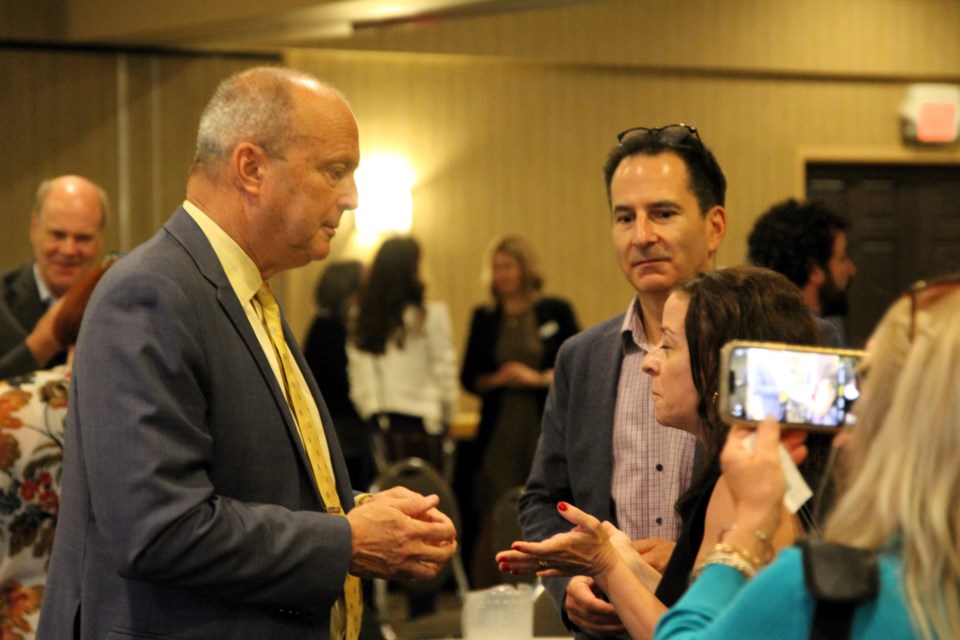THUNDER BAY – Thunder Bay Chamber of Commerce Leader’s Luncheon was a fruitful event for all in attendance as the business community got to rub elbows with City Manager John Collin in his first public event since accepting his role with the city.
After his presentation where he outlined his views on how to perpetuate stable population growth in Thunder Bay, he answered questions from the crowd.
Chamber President Charla Robinson asked Collin to explain the city’s proposed assessment growth policy.
During a budget discussion on Aug 26, administration recommended developing an Assessment Growth Policy in the 2025 Operating and Capital Budgets to fund growth-related projects.
Essentially, the idea is a growth and innovation reserve that can be used for existing services, new developing services, or community activities that support the growth of the city.
“We need a chunk of money, even in these very difficult financial times, that we have because we're not even keeping up with inflation, we need a chunk of money to re-enforces success,” Collin said.
“So, when we get a good growth idea, which is the equivalent of success, we need to be able to fund it. That's the idea behind this fund. I'd love to attribute it all right now, but we need to plan first because otherwise, we might be throwing good money away on things that aren't truly successful.”
Laura Craig from the Business Development Bank of Canada wondered if Collin had any plans for those people who work and purchase goods in the city but who do not add to Thunder Bay’s tax base.
Collin’s frank answer was no.
He explained that Thunder Bay’s population is approximately 110,000 and the surrounding municipalities have around 20,000. For larger cities with smaller surrounding municipalities, the impacts from commuters are much larger.
“It's nowhere near as big an issue for right now, and it is an issue that is emotionally charged and becomes very, very difficult to manage,” Collin said.
“Quite frankly. I have bigger fish to fry for now.”
Vice Provost International at Lakehead University James Aldridge asked Collin if he was willing to advocate against the federal government's cuts to how many international student permits Canada will issue.
Immigration Minister Marc Miller announced on Wednesday that the federal cap for temporary residents in Canada will be reduced further from 6.5 per cent of the total population to five per cent.
This number is quite concerning to Lakehead University as this will affect the institution's revenue stream as international students pay heftier tuition fees than domestic students.
Another concern is the impact this reduction will have on the city's growth as international students also work and live off campus.
Collin has only been in the role for three months, but he said that the city has and will continue to advocate for international students.
“Certainly, one of the key messages we do have for anyone who will listen is a talent pipeline is essential to growth. We have a AAA University in Thunder Bay. We have a college in Thunder Bay. Our talent pipeline is there and both of those institutions not only offer a wide variety of programs, they both offer programs that have been catered to the business needs here,” said Collin.
In an interview with Newswatch, Aldridge said he understood that it’s not the job of the city manager to advocate higher levels of government to allow more international students into the country.
However, his support brings awareness to the problem. If there was any way for the city to convey that the city can not only support migrants willing to stay in Thunder Bay after they graduate, the city would be in a better position to grow.
“But I do think it's really important that everybody in the community understands that changes that are coming and that have already come to some degree will impact the ability of the city to grow. To be more prosperous for us to grow its population and its business growth as well,” said Aldridge.
“So, we wanna make sure that we're all thinking in a way that helps those international students be able to come here in greater numbers and also to stay and find the work.”
Robinson’s second question involved picking Collin’s brain about developing housing on Parkette lands.
She called out that advocacy groups went to council to try and stop the development of infill housing on small areas of greenspace.
“Is it a communication piece? Is it an education piece that may be councillors aren’t seeing the bigger picture on the economic impact of a park which is a cost to the city versus a park that is being turned into a housing development which generates housing but also economic taxes, et cetera,” Robinson said.
“What are your thoughts on how we can make sure that some of those opportunities are in the future?”
Collin pointed out that developing housing on a parkette isn’t going to solve Thunder Bay’s housing problem.
“I would suggest to you that the fundamental question is the economic benefit of a fourplex on a parkette more important than the parkette itself to our social fibre. That's the issue,” Collin said.
“We're thinking too small. I will tell you quite honestly, I will do whatever counsel asks me to do. I could care less about a parkette.”
“They're not going to solve our problem. We're not going to have the housing we need by addressing it four units at a time. We're just not.”
